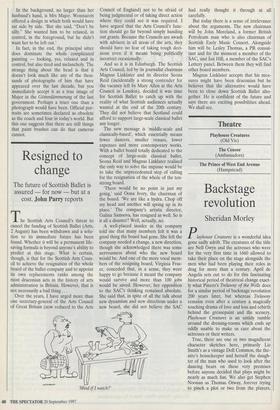Resigned to change
The future of Scottish Ballet is assured — for now — but at a cost. John Parry reports The Scottish Arts Council's threat to cancel the funding of Scottish Ballet (Arts, 2 August) has been withdrawn and a solu- tion to its immediate future has been found. Whether it will be a permanent life- saving formula is beyond anyone's ability to predict at this stage. What is certain, though, is that for the Scottish Arts Coun- cil to achieve the resignation of the whole board of the ballet company and to appoint its own replacements ranks among the most draconian acts in the history of arts administration in Britain. However, that is not necessarily a bad thing ...
Over the years, I have urged more than one secretary-general of the Arts Council of Great Britain (now reduced to the Arts Mind if I watch?' Council of England) not to be afraid of being judgmental or of taking direct action where they could see it was required. I have argued that the Arts Council's func- tion should go far beyond simply handing out grants. Because the Councils are awash with advisers in all areas of the arts, they should have no fear of taking tough deci- sions even if it means being politically incorrect occasionally.
And so it is in Edinburgh. The Scottish Arts Council, led by its journalist chairman Magnus Linklater and its director Seona Reid (incidentally a strong contender for the vacancy left by Mary Allen at the Arts Council in London), decided it was time for Scottish Ballet to catch up with the reality of what Scottish audiences actually wanted at the end of the 20th century. They did not believe that Scotland could afford to support large-scale classical ballet any longer.
The new message is 'middle-scale and classically-based', which essentially means fewer dancers, smaller venues, lower expenses and more contemporary works. With a ballet board totally dedicated to the concept of large-scale classical ballet, Seona Reid and Magnus Linklater realised the only way to solve the impasse would be to take the unprecedented step of calling for the resignation of the whole of the ten- strong board.
`There would be no point in just my going,' said Oona Ivory, the chairman of the board. 'We are like a hydra. Chop off my head and another will spring up in its place.' The company's artistic director, Galina Samsova, has resigned as well. So is it all a disaster? Well, actually, no.
A well-placed insider in the company told me that many members felt it was a good thing the board had gone. She felt the company needed a change, a new direction, though she acknowledged there was some nervousness about who the new board would be. And one of the more vocal mem- bers of the resigning board, Virginia Fras- er, conceded that, in a sense, they were happy to go because it meant the company would survive and more than 100 jobs would be saved. However, her opposition to the SAC's thinking remained absolute. She said that, in spite of all the talk about new dynamism and new directions under a new board, she did not believe the SAC had really thought it through at all carefully.
But today there is a sense of irrelevance about the arguments. The new chairman will be John Moreland, a former British Petroleum man who is also chairman of Scottish Early Music Consort. Alongside him will be Lesley Thomas, a PR consul- tant and for the moment a member of the SAC, and Ian Hill, a member of the SAC's Lottery panel. Between them they will find other board members.
Magnus Linklater accepts that his mea- sures might have been draconian but he believes that the alternative would have been to close down Scottish Ballet alto- gether. He is confident of the future and says there are exciting possibilities ahead. We shall see.


































































 Previous page
Previous page